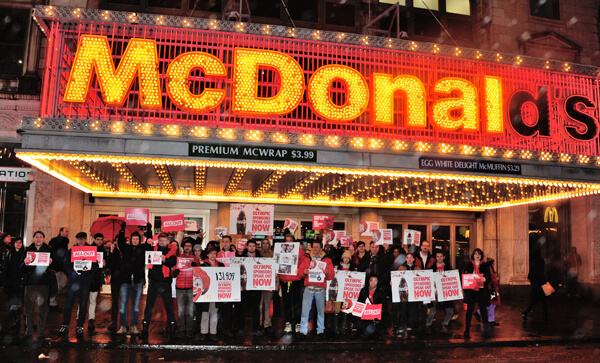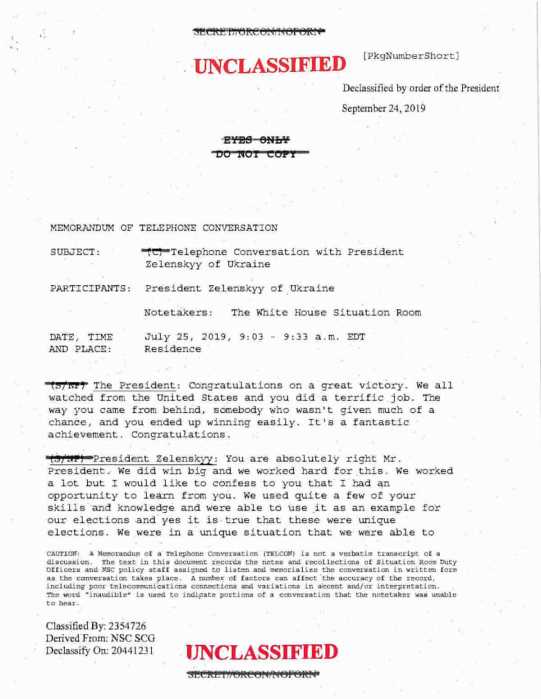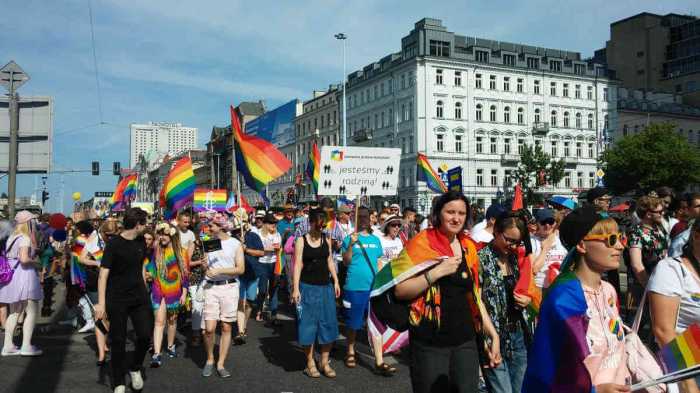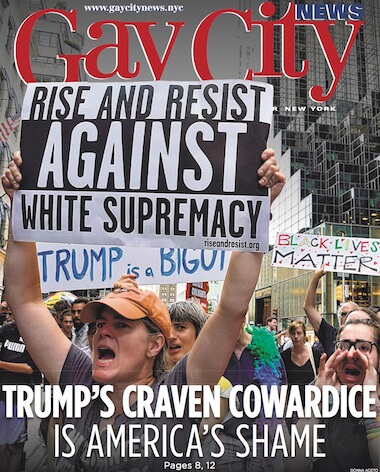BY PAUL SCHINDLER | Even as arrests in Sochi, Moscow, and St. Petersburg demonstrated the Putin regime’s determination to squelch protest — particularly regarding Russia’s harshly anti-gay law enacted last year — through the remainder of the Sochi Winter Olympics, activists around the world are focusing their sights on addressing the homophobia there and at future Olympics after this year’s Games conclude on February 23.
Queer Nation, which has led New York street protests against Russia since last summer, is calling on the New York State and New York City comptrollers to put pressure on a Russian telecommunications company — in which state and city pension funds hold stock — whose principals control a social media site used by neo-Nazis and other vigilantes to promote and carry out anti-LGBT violence.
And All Out, which organizes for global LGBT equality through social networking, and Athlete Ally, which works to end homophobia and transphobia in the sports world, are demanding that the International Olympic Committee apply the nondiscrimination provision of its charter to ensure that future venues for the Games do not have discriminatory laws like those of Russia.
Last June, Russia enacted legislation that essentially outlawed public discussion of homosexuality — under the pretext of preventing the dissemination of information about gay life to young people. Since that time, that nation has been swept by a wave of anti-LGBT attacks, including kidnappings, torture, rape, and murder, some of those crimes brazenly boasted about on videos that have circulated.
In Sochi on February 18, the world media lit up with reports that two members of Pussy Riot, Maria Alyokhina and Nadezhda Tolokonnikova, were among a group of more than a dozen arrested in central Sochi, about 30 minutes from the Olympics site, in connection with a theft at a local hotel. USA Today quoted Alexander Popkov, an attorney for the two punk band members, saying the women were beaten by police before his arrival at the police station. According to CNN, the women were meeting with journalists at the time of their arrest. TheGuardian.com, a British news organization, reported that the arrestees were released several hours after being taken into custody, with no charges filed.
Alyokhina and Tolokonnikova served nearly two years in penal colonies after a 2012 demonstration and performance in Moscow where they mocked Russian President Vladimir Putin. The women charged that their release in December, as part of a general amnesty, was intended to pump up Putin’s image on the world stage in advance of the Olympic Games.
The New York Times reported that among those arrested with the band members in Sochi was Semyon Simonov, a Russian activist who provided legal assistance to immigrant laborers brought into Russia to work on Olympic construction sites.
“These targeted arrests are clearly another effort by Russian authorities to prevent voices of dissent from being visible in and around the Olympic Park,” said Shawn Gaylord from the Washington-based Human Rights First, who was on hand in Sochi over the past week. “The Russian authorities’ relentless efforts to shut down freedom of expression, particularly when it is coming from the LGBT community, is further proof that Russia is more interested in creating a climate of fear for its citizens than allowing for the free exchange of ideas that characterize modern nations.”
In the two days prior to the Pussy Riot arrests, Vladimir Luxuria, a transgender former member of the Italian Parliament, was twice apprehended by Russian authorities, first for holding up a sign in Olympic Park reading “Gay Is Okay” and later for wearing rainbow-colored headwear into the hockey arena, according to the Washington Post.
In the days leading up to the Games’ opening on February 7, small groups of LGBT demonstrators were arrested in Moscow and St. Petersburg.
On February 18, Queer Nation, in a written release, said it had learned that public pension funds controlled by State Comptroller Thomas DiNapoli and City Comptroller Scott Stringer own shares in MegaFon, a major Russian telecommunications company. According to the group, Ivan Tavrin, MegaFon’s CEO, and Alisher Usmanov, the company’s major investor, own just over half of the social media site vk.com, which Queer Nation said is used by Russian right-wing ultranationalists to encourage and carry out anti-LGBT violence. The group linked more than 1,500 kidnappings and beatings by Neo-Nazis and other vigilantes to activity on the site.
The state and city pension fund holdings, discovered through a Queer Nation Freedom of Information Law request, were first reported by John Arovosis on AmericaBlog.com.
Queer Nation is calling on DiNapoli and Stringer to press Tavrin and Usmanov to remove the anti-LGBT material from the vk.com site. Last year, DiNapoli faced pressure from elected officials, including State Senator Brad Hoylman, Assemblyman Daniel O’Donnell, and City Councilman Daniel Dromm, all out gay Democrats, to divest the state pension funds of Russian holdings. In response, the state comptroller joined by Stringer’s predecessor, John Liu, instead issued a call for major US Olympic sponsors to speak out against the anti-gay legislation in Russia.
Stringer’s offices declined comment on the AmericaBlog story and the Queer Nation demand. A spokesperson for DiNapoli’s office indicated they are looking at the issue, but noted that the MegaFon holding is in a part of the pension funds’ portfolio managed by an independent fund manager outside of the comptroller’s direct control and that the information available indicates that shares in vk.com are not owned directly by MegaFon, but rather individually by principals at the telecomm company.
Also on February 18, All Out and Athlete Ally in tandem with out gay former Olympic diving champion Greg Louganis called on the International Olympic Committee to apply Principle 6 of its charter, which states that discrimination is inconsistent with the spirit of the Games, to its screening of future host cities.
“Hosting the Olympic Games is an honor,” said Hudson Taylor, Athlete Ally’s executive director. “It should only be bestowed upon countries that demonstrate a commitment to human rights and the principles of the Olympic Games.”
Both Queer Nation and All Out were active in New York City in the days leading up to the Games in keeping a spotlight on discrimination in Russia. On February 6, Queer Nation turned out a crowd it pegged at more than 100 at the Russian Consulate on 91st Street on the Upper East Side, some wearing masks representing President Vladimir Putin, several of whom dumped fake blood on an Olympic flag.
“The whole world is watching — literally,” said Queer Nation member Ken Kidd in a press release from the group. “Putin can’t hide his pogrom behind the sports page.”
Queer Nation member Scott Wooledge took a lead role last month in hijacking McDonald’s #CheersToSochi Twitter hashtag, which critics of the Sochi Games used to demand that Olympic sponsors denounce Russia’s anti-gay law. Since then, he and other activists created a parody site, CheersToSochi.org, to lampoon McDonald’s CheersToSochi.com.
Nearby the consulate, members of the Axios Eastern Orthodox Christians group, also on February 6, brought their message of opposition to Russia’s new law to the Synod of Bishops of the Russian Orthodox Church Outside Russia on East 93rd Street. “Realize that we are your children too,” one sign read. “Speak up against the violence against LGBT people.”
On the evening of February 5, All Out organized events around the world, also calling on Olympic sponsors to take on their Russian hosts. Outside a McDonald’s in Times Square, several dozen demonstrators held up signs with insignias from the hamburger chain and Coca-Cola that read “Olympic Sponsors Speak Out Now.”





































